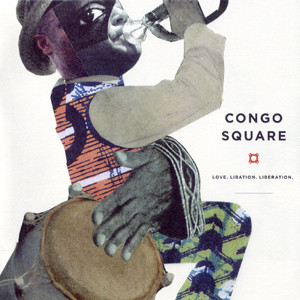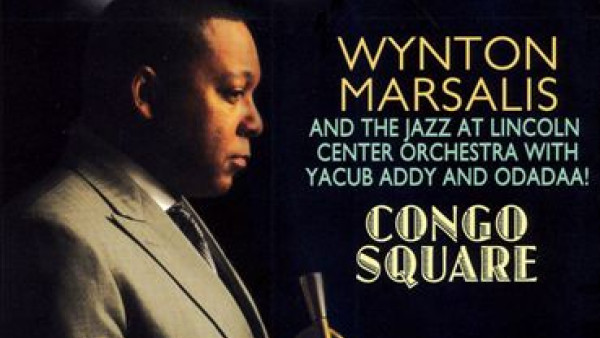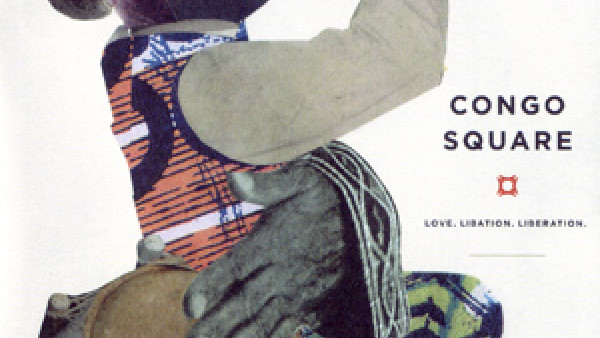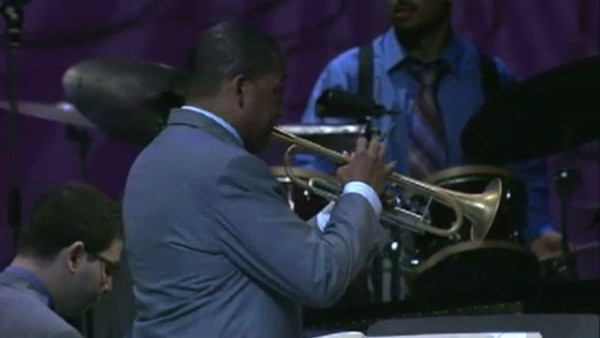Wynton Marsalis conjures sounds of early jazz in “Congo Square’
The drums return when famed jazz trumpeter Wynton Marsalis opens the 2007 season of the Mountain Laurel Center for the Performing Arts with a new composition, “Congo Square,” written in collaboration with the Ghanaian master drummer Yacub Addy.
Addy and his nine-piece African drumming ensemble Odadaa! will join Marsalis and the 15-piece Jazz at Lincoln Center Orchestra for a percussion-fueled performance of a composition that fuses music at the very roots of jazz with modern big-band sound. Marsalis co-founded the Jazz at Lincoln Center program in 1987, and has been music director of the JLCO since 1988.
Odadaa! is named after a traditional rhythm of the Ga people of Ghana. It combines African percussion, rich vocals, bamboo flutes and balaphones (something like marimbas) into a heady mix of soulful lyricism and unbridled swing.
“Congo Square” appropriately premiered in New Orleans, Marsalis’ birthplace, in 2006, and is on a country-wide tour from the deep South to Canada. That it was first performed in the aftermath of Hurricane Katrina gives it a special significance for Marsalis. “This music is so life-affirming, it’s a common expression of our humanity,” he said at the premiere.
Marsalis spoke about the “Congo Square” collaboration in a teleconference from Lincoln Center.
Q: How did you meet Yacub Addy?
A: I went to hear a performance of his group at Symphony Center in New York in 1991. I loved them, they were beautiful players — very festive, with lots of dancing and singing. We discussed doing “Congo Square” back then, but weren’t ready to do it. We had to learn about each other’s ensembles, and figure out how to come together. We did our first collaboration together at Columbia University in 2003.
Q: Is there more of a synthesis or give-or-take between the two groups?
A: It’s a give-and-take, a lot of coming together, a lot of balance. We improvise, we play with each other, we have war with each other, we make peace with each other. It’s like a kind of family.
Q: Are there any areas of difficulty in the two groups coming together?
A: Oh yeah! The rhythms are complex — it’s hard to describe but if I could play it for you you’d understand it. At the center of the music is the cow bell, which plays the bell pattern. All the rhythms fit in against the bell. The bell is articulated by what Afro-Latin musicians call the clave. Our bass player Carlos Henriquez grew up playing Afro-Latin music, listening to the clave, whereas we play on beats. He has been a key essence for us to be able to play with them. But like anything else, you find a common ground — not just to tolerate each other and have a good time, but to embrace each other and have great time. Jazz is really a great tool for diplomacy.
Q: Do you see “Congo Square” reaching back further to jazz roots?
A: No. Our philosophy is that we never reach back to anything. Picasso once said if a work of art can’t be considered in the present, it shouldn’t be considered at all. So our thing is that we play all music as it is right now. The musicians in our band — some of the best jazz musicians in the world — are not interested in re-creating any styles, we just want to be comfortable in the language of that style. All our music is modern by the way we play it.
Q: Any other plans for collaborations?
A: The JLCO is a year-round band, and we are always working on collaborative projects. Just in the last six months we’ve played with the Chicago Symphony, and went on tour with them all over the Southern U.S., playing classic American pop and big band arrangements. We did a concert with Willie Nelson in Nashville, and a show with the Museum of Modern Art called “Jazz in Art,” and did a concert combining some of my compositions based on church and gospel music.
Q: What makes “Congo Square” different from your other collaborations?
A: Getting together with the people of Ga — they play in a whole different way from us. We had to overcome difficulties like figuring out where the bell patterns were coming from. But it has produced the most festive and uplifting sound our two types of music can achieve, using the different grooves and rhythms of each.
Q: Some of your recent projects confront misogyny, racism and materialism. Do you feel you are following in the footsteps of, say, Charles Mingus, who also had a political voice?
A: I respect and love Mingus, especially his pieces on “Meditation on Integration” and “Fables of Faubus.” I like his fusion of styles — modern and traditional, American and European. I like the fact that he voiced his opinions and expressed himself. But of course, I also love Ellington, Monk and Gershwin — all great musicians that have tried to bring things together and come up with an American ethic in music.
Q: When you appeared at Lehigh University’s Zoellner center some time ago, you commented that musicians, especially good ones, get bored too fast — they want to play different stuff. Do you personally find the classical repertoire limiting, with more freedom in jazz?
A: No question about that for the trumpet. It’s different for the piano or the violin, there’s so much literature there. We have some OK modern trumpet concertos, some great classical concertos, a lot of baroque music. But we have nothing like Beethoven sonatas for the trumpet. I used to be a real fan of Renaissance music, and collected small choral trumpets, and long, natural horns. But man, if I tried to play one of those now I would sound so sad you wouldn’t want to hear it.
Q: What direction do you see jazz going in?
A: I don’t think art forms go in any direction. People just play, they do their thing. Sometimes individual voices come up and are powerful enough so that people follow them. But that doesn’t take anything away from what was already there. Ellington’s music didn’t cease to exist because Coltrane began playing in modes.
By Steve Siegel
Source: The Morning Call
WYNTON MARSALIS AND THE LINCOLN CENTER ORCHESTRA
What: The jazz trumpeter and his group, along with the African drumming ensemble Odadaa!, perform “Congo Square. “
When: 8 p.m. Saturday
Where: Mountain Laurel Center for the Performing Arts, Bushkill Falls Road, Bushkill
Tickets: $20-$50
Info: 570-426-2080, www.mountainlaurelcenter.com




